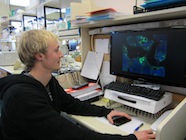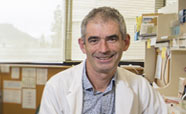Researcher profiles:
- Professor Parry Guilford
- Dr Augustine Chen
- Dr Nicola Bougen-Zhukov
- Dr Lyvianne Decourtye-Espiard
- Tanis Godwin
- Tom Brew (PhD candidate)
Unraveling tumour suppression
E-cadherin belongs to a class of proteins called tumour suppressors. Tumour suppressors normal cells with brakes to protect against cells growing out of control and becoming cancers. Mutation of the gene that encodes E-cadherin (CDH1) is frequently seen in tumours. This leads to cancers with increased ability to survive and invade other tissues.
Finding vulnerabilities in tumour cells
We propose that the loss of E-cadherin creates vulnerabilities in the tumour cells that could be targeted with drugs. In this project we are systematically searching for proteins which, if inactivated, will not affect cells with normal levels of E-cadherin but will lead to the death of cancerous cells lacking E-cadherin. This is known as a synthetic lethal relationship.
Supporting research in Louis' memory
In 2017 Louis Fouchault was diagnosed with gastric cancer. Upon his death, Louis' friends and family raised funds which were donated to CTCR to further our work with synthetic lethal drugs which will one day benefit his nieces and nephews and all other CDH1 mutation carriers.
Related topics
Past Students
- Bryony Telford (PhD research project)
- Henry Beetham (PhD research project)
- James Frick (master's research project)
Support our Research
International Collaborations
- University of British Columbia (Canada)
- IPATIMIUP (Portugal)
- Pontificia Universidad Católica de Chile (Chile)

Henry Beetham assessing CDH1 expression in gastric cancer cells.
Related info
Genetic mutation behind inherited stomach cancer Parry Guilford is interviewed by Robyn Williams on RN The Science Show, ABC Australia website, 5 mins
Life saver
2017 Distinguished Research Medal winner Professor Parry Guildford can count among his many achievements the discovery of the first-known gene for inherited gastric cancer and the development of a simple-to-use non-invasive test for bladder cancer.

Genetic jeopardy
Knowledge of her whakapapa saved Dr Karyn Paringatai's life. Now this experience is inspiring her research.

